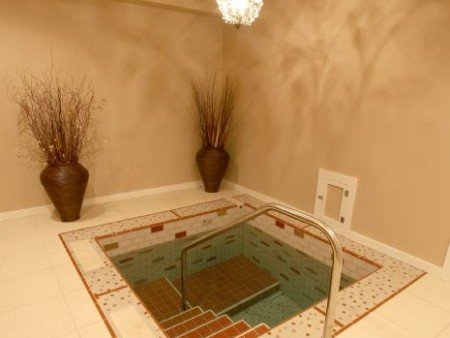|
A mikvah is a specially constructed ritual pool in which women immerse to purify themselves following their monthly menses. Observance of the mitzvah of mikvah and all its details, known as taharas hamishpachah, family purity, is considered the cornerstone of Jewish life.
A mikvah is constructed by digging two pits, either side by side or one atop the other. The bottom pool, or one side pool, is filled with rainwater, while the other is filled with fresh water, and the water changed regularly. A hole connects the two pools, giving both pools the status of a mikvah. The process of collecting rainwater for the mikvah is an intricate one, since the water must be connected to its source at all times.
The geographical position of Eilat, Israel, causes various objective problems when it comes to building a mikvah. Eilat is in the Negev desert, where it seldom rains. Many winter seasons can pass without any real precipitation. And when it does rain, it is not continuous, making it very difficult to fill up a mikvah with rainwater. With this being the case, the rabbis of Eilat rely on a halachic ruling permitting the cistern of the mikvah to be filled with ice. However, according to all opinions a mikvah filled with rainwater is preferable.
When Rabbi Yosef Hecht first arrived in Eilat to serve as rabbi, he was very bothered by this problem. However, there was no alternative but to rely on the more lenient view. Yet, Rabbi Hecht decided that he would do his best to fill up the cistern with pure rainwater. He gave instructions to empty the cistern in a particular mikvah and prepare it to be filled up with rainwater. In the meantime, he prayed to G-d to grant them sufficient rain to be able to fill the cistern.
The winter passed and the mikvah remained completely dry. The members of the local religious council put pressure on Rabbi Hecht to abandon the idea and fill the mikvah with ice. Their claims were in fact justified, as the mikvah was left empty and unusable. Somehow he managed to convince them to wait until the next winter.
When the rainy season approached, Rabbi Hecht was very worried about the problem. He decided to ask the Lubavitcher Rebbe for his blessing. There are many stories in the Talmud about righteous Jews praying for rain. “If it is permitted to turn to a tzadik for the sake of watering the soil to yield better produce, surely it is permissible to approach a tzadik for the sake of the observance of the mitzvah of family purity at the highest level,” he reasoned.
Rabbi Hecht wrote to the Rebbe describing the situation in detail, and asked that the Rebbe arouse Divine compassion so that rains would fall and fill up the cistern for rainwater in the Eilat mikvah. Not long after sending off this letter, rain began to fall in torrents for a period of eight hours.
It is worthwhile to note that the rains fell on the night of the Shabbat when the Torah portion of Noah is read! It is written in Scriptures and in Chassidic discourses that the forty days of the deluge are connected with the forty seah (a measure) of water needed for a mikvah. The purpose of the deluge was to purify the world, and that is why the whole earth was immersed under water. In Eilat they saw that the deluge that poured down on Shabbat brought about additional holiness in the observance of the laws of Jewish family purity.
|
